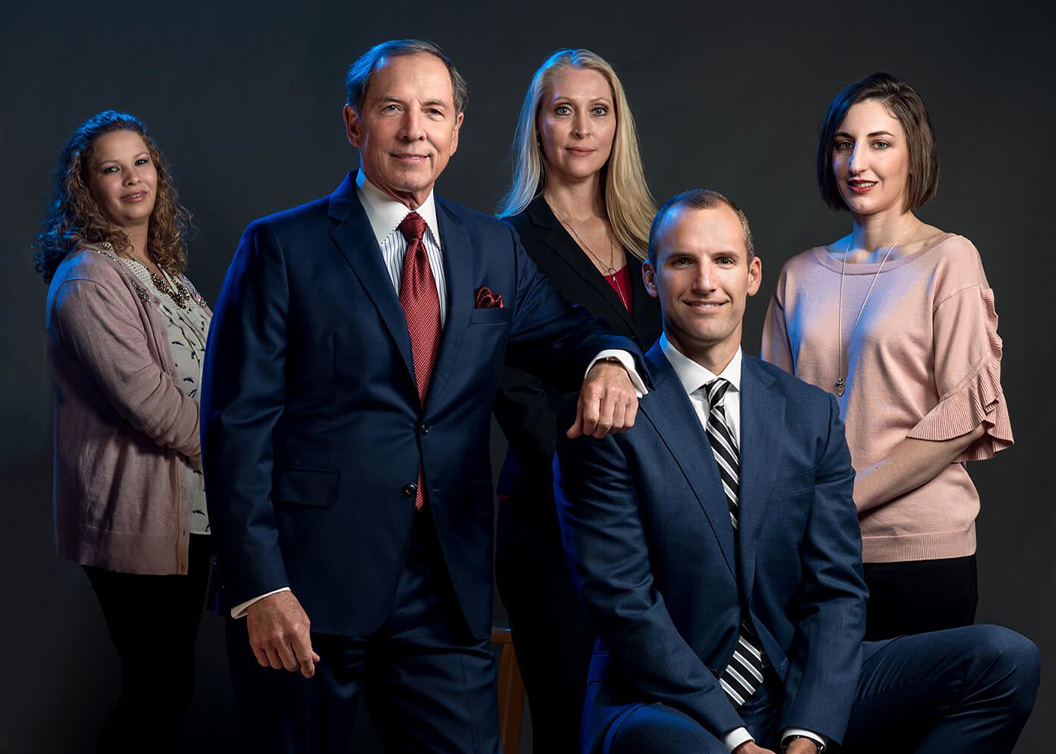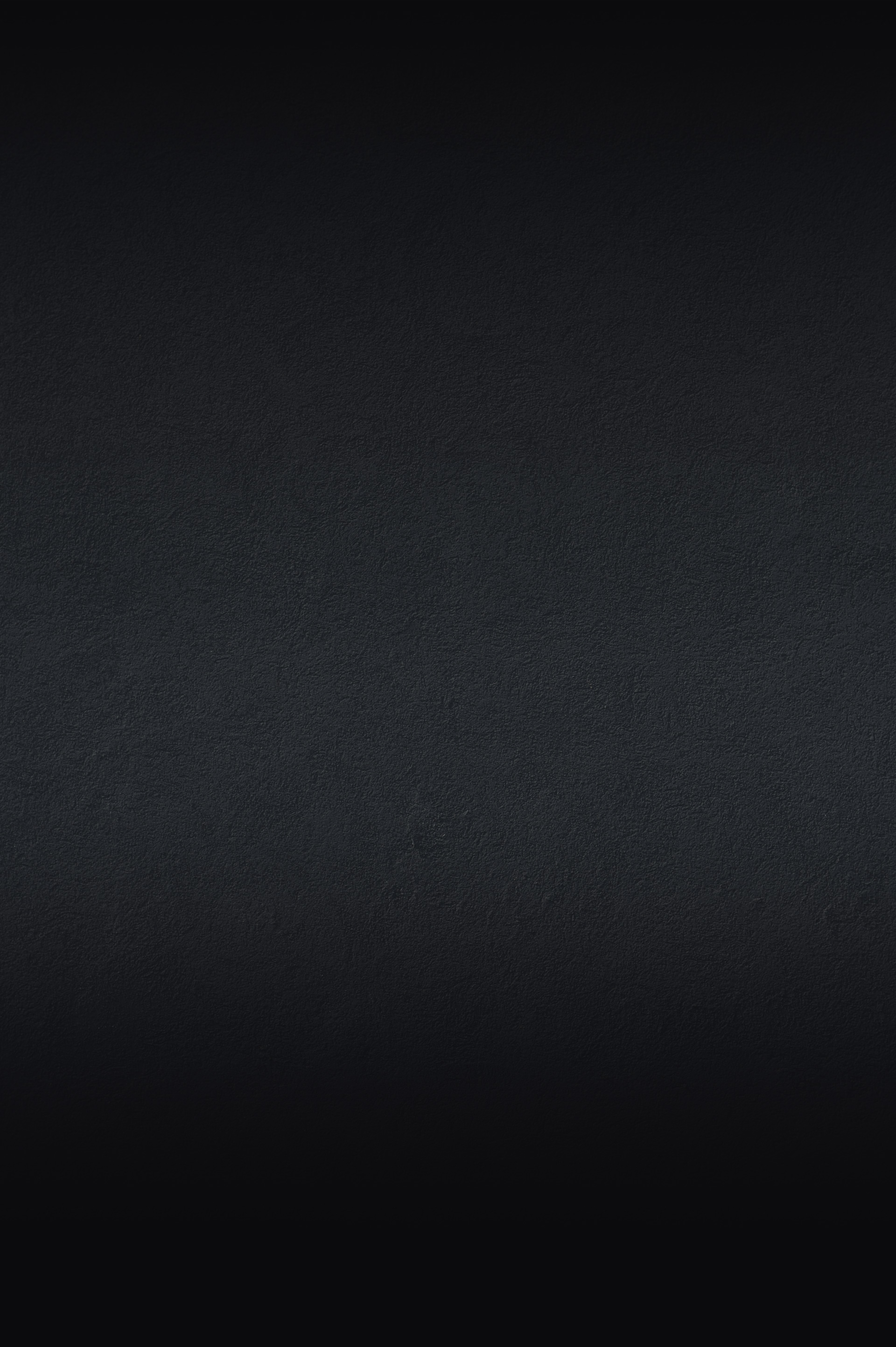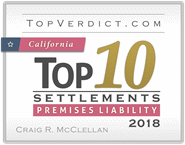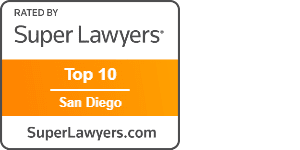
Uninsured & Underinsured Motorists
UM / UIM Accident Attorneys in San Diego, CA
California requires drivers to maintain auto liability insurance to pay for any injuries or property damage they cause—the minimum for which is $15,000 for injury or death to one person, $30,000 for injury or death to two or more people, and $5,000 for property damage.
Unfortunately, not everyone complies with this requirement, and not all drivers carry enough insurance to fully cover the needs of injured victims.
If you or a loved one have been injured in an accident involving an uninsured or underinsured motorist, working with an attorney can help you determine whether there may be viable options for recovering compensation through other means.
Damages caused by an uninsured or uninsured driver may be covered under your own policy and/or another at-fault party. Call the San Diego uninsured & underinsured motorist accident lawyers at The McClellan Law Firm to discuss your options during a free consultation: (619) 215-1488.
How UM / UIM Accidents Put Victims at Risk
In a perfect world, those deemed at fault for causing an accident fully compensate victims for their damages. Unfortunately, some accidents involve at-fault motorists who carry only minimum liability coverage, low-limit policies, or no auto insurance whatsoever.
In such scenarios, victims face considerable risks of having to pay for their damages – which, depending on the severity of injuries and scope of losses, can be extensive.
For these reasons, all motorists are strongly encouraged to purchase uninsured / underinsured (UM / UIM) coverage. This form of additional coverage is optional in California, but it can make the difference when it matters most.
California insurance companies offer policies of various terms and monetary limits, which may include:
- Uninsured Motorist Property Damage (UMPD): This coverage pays for property damage (i.e. vehicle damage) caused by an at-fault driver who does not have insurance. UMPD has a lower limit, and only pays when uninsured motorist is identified (not in a hit-and-run).
- Uninsured Motorist Bodily Injury (UMBI): This coverage will pay for injuries to you and any passengers in your car caused by an at-fault driver who does not have any insurance.
- Underinsured Motorist (UIM): This coverage is for damages caused by an at-fault driver whose insurance is inadequate to cover all of your damages.
The California Department of Insurance has additional information about auto insurance, including UM / UIM, medical payments (Med Pay) coverage, other types of coverage.
Exploring Coverage & Compensation Options
In the event that you or a loved one are injured by an uninsured or underinsured motorist, your ability to cover damages incurred depends greatly on whether viable options for coverage and compensation exist. Typically, this would involve:
- A claim with your own auto insurance carrier (if you have UM / UIM coverage); and/or
- Claims against other parties that may have contributed to the crash (if they have sufficient insurance coverage);
How Does UM / UIM Coverage Work & Who Is Covered?
If your auto policy contains coverage for uninsured or underinsured motorists (UM / UIM), you would seek compensation by filing a claim with your own insurance carrier – either when there is no available insurance coverage (uninsured driver accident) or the limited available coverage has been exhausted (underinsured motorist coverage). Drivers with UM / UIM coverage can also bring claims for accidents with hit-and-run drivers.
To be eligible for UM / UIM coverage, you:
- Must be hit by a vehicle (actual “physical contact”);
- Do not have to be inside a vehicle (i.e. can be outside changing a flat);
- Can be the victim of a pedestrian accident or bicycle accident with an uninsured driver.
While you must generally be the named primary insurance policy holder to be eligible for UM / UIM coverage, you may still be covered even if you do not personally have UM / UIM coverage.
For example, you may be covered if:
- You live with a relative who has UM / UIM coverage (i.e. parents, children, in-laws, etc.);
- You were driving a covered vehicle with the owner’s permission;
- You were a passenger in a covered vehicle.
What Damages Will a UM / UIM Policy Cover?
If you have UM / UIM coverage, it should be clearly listed as part of your auto insurance policy. The coverage can pay for property damage and medical bills in accidents caused both by uninsured or underinsured drivers (when low-limit coverage is exhausted).
Depending on the coverage you purchase, you can recover compensation for a range of losses under your UM / UIM policy. This may include:
- Ambulance and hospital bills;
- Loss of wages;
- Pain and suffering;
- Loss of future income;
- Diminished earning capacity.
UM / UIM insurance generally does not allow for recovery of punitive damages, and some policies do not cover property damage; however, collision coverage (if available), may be used to cover the cost of property damage, minus the deductible.
Is There a Deadline For Filing a UM / UIM Claim?
In California, the statute of limitations for filing a UM / UIM claim is generally two years from the date of the accident.
While the two-year deadline applies to UM claims, it may not always apply to UIM, per California case law. However, it is advised that anyone with a potential claim carefully review their policies and file claims within a reasonable amount of time – both to preserve their right to compensation, and because there may be contractual provisions which set the deadline for filing certain claims at one year, as opposed to the two-year statute of limitations for civil personal injury lawsuits.
Our legal team can assist you in reviewing the specific terms of your policy.
Does UM Insurance Cover Hit-and-Run Accidents?
One significant benefit to UM coverage is that it also covers hit-and-run accidents. Whether a driver who fled the scene of an accident is later discovered (and charged with a crime) or not, you will still have options for recovering compensation if you have this coverage. Keep in mind that even when hit-and-run drivers are apprehended, they often do not have insurance, and any restitution ordered by criminal courts is unlikely to ever provide meaningful recompense.
To preserve your UM protection in the event of a hit-and-run collision, you must report the accident to law enforcement within 24 hours and to your insurance carrier within 30 days (CA Insurance Code §11580.2(b)(2)).
Here are some helpful details about UM insurance and hit-and-run accidents:
- Physical contact: If you have UM / UIM coverage, you can file a claim under your own insurance (if there was actual physical contact), and can recover compensation for most of the expenses incurred – including the cost of your medical treatment and any loss of income. Collision coverage may be used to cover property damage resulting from a hit-and-run-accident.
- Multi-vehicle collisions: If you were involved in a multi-vehicle accident where the hit-and-run driver (or “phantom” vehicle) struck another vehicle which then struck you, you may also be protected by UM coverage, as California courts have ruled that such a collision qualifies as “physical contact” (Inter-Insurance Exchange v. Lopez (1965) 238 Cal.App.2d 44).
- Swerving: The physical contact rule (which exists to deter fraud) applies to cases where UM insured drivers swerve to avoid hitting a negligent hit-and-run driver, and the swerving causes them to strike another vehicle. California case law holds that there must be actual physical contact from the “phantom” vehicle in order to file a UM claim (Page v. Insurance Co. of North America (1969) 3 Cal. App. 3d 121). Swerving in and of itself is not enough to be covered.
- Outside your vehicle: If a hit-and-run driver struck you or your vehicle while you were outside of the vehicle, you may still be covered by your UM policy. California’s Uninsured Motorist Act allows for UM coverage for any person who is in their vehicle, or “upon” entering or getting out of their vehicle (Ins C §11580.2(b)). This may include victims injured while changing a flat tire, pumping gas, opening the hood of their engine, or generally “using” their vehicle.
Can I Use UM / UIM When My Accident Was Caused by Something That Fell Off Another Vehicle?
Generally, yes. UM / UIM insurance can cover damages caused by debris which fell of a “phantom” vehicle that cannot be located. Just as with hit-and-run accidents, you must show sufficient physical contact occurred – i.e. a part or component from another vehicle, or an object the vehicle was carrying (such as cargo, furniture, or loose debris), strikes you / your car.
In California, stationary objects which are struck in the roadway do not trigger UM protection; some applied force from the uninsured (or unidentified vehicle) must exist. This means the object must have been actually falling off a vehicle / moving at the time of a collision (Barnes vs. Nationwide Ins. (1986) 186 Cal.App.3d, 541.).
Do I Need An Attorney If I File a Claim With My Own Insurance Company?
It may be natural to believe the company from which you purchase insurance is “on your side” – until they aren’t. Insurance carriers are major corporations, and their business is built on prioritizing profits over people. Even if you have UM / UIM coverage, compensation is never guaranteed. You will still need to prove to the insurance company that the other driver or other parties involved were at fault, and that you are eligible to file a claim.
Based in San Diego, The McClellan Law Firm has decades of experience helping victims and real people fight back against insurance companies that want to pay as little as possible – both in personal injury cases and insurance disputes where claims are unfairly delayed, underpaid, or denied in bad faith. We know how insurance companies operate, understand the complex laws and regulations to which they’re bound, and have the experience to ensure they uphold their legal duties in our clients’ times of need.
What If UM / UIM Coverage Isn’t Enough To Cover Damages?
Americans face some of the highest costs for medical care in the developed world, which means medical expenses and other damages resulting from an accident can quickly mount to exorbitant sums. It is not improbable for victims’ damages to exceed the policy limits of their own coverage – particularly in cases involving wrongful death or catastrophic injuries.
As part of our work representing injured victims, our legal team devotes considerable time and energy to exploring all available options. In some cases, there may be additional avenues for coverage from which victims may be compensated – if liability can be proven. Examples include:
- Civil lawsuit against the motorist: If a person with little to no insurance coverage negligently causes an accident and injuries, it may be possible to file suit against that individual for additional damages not covered under their liability insurance, or a victim’s own UM / UIM policy. Because there is never any guarantee a person with little to no insurance will have sufficient assets to cover any judgment in such suits, this may not always be a viable option – and is all the more reason to purchase a sufficient amount of UM / UIM coverage.
- Other motorists: It may be possible to seek compensation from other motorists who may have contributed to an accident (i.e. a multi-vehicle crash, or roadway hazards created by commercial trucks and unsecured cargo). If the uninsured motorist was behind the wheel of a vehicle owned by a commercial business, it may also be possible to seek compensation from the business’ insurance coverage.
- Product defects: Manufacturers of defective products or defective auto parts which contributed to an accident can be held liable for damages victims suffer – whether the defective product was the underlying cause of the accident, or a contributing factor. This may include crashes caused by a tire defect on an underinsured driver’s car, or defective tie-downs which fail to keep cargo properly secured on vehicles.
- Public entities: Government entities responsible for roadway defects that caused or contributed to a motorist’s collision may be held liable for their respective percentage of fault.
- Uber / Lyft: Passengers who use rideshare services such as Uber or Lyft are covered by the company’s commercial insurance policy (typically a $1M policy). If victims (or rideshare drivers for that matter) are injured in rideshare accidents by an uninsured or underinsured motorist during a fare, they may be covered by the commercial policy.
- Dram shop / social host liability: California has passed legislation to severely limit third-party liability involving “dram shop” laws, which can be used to hold bars and other establishments financially liable for damages caused when patrons whom they overserved cause drunk driving accidents. In California, such liability is limited; however, bars, restaurants, liquor stores, and even private social hosts may be held liable for damages resulting from drunk driving accidents caused by persons they serve under two exceptions:
- The drunk driver was a minor under 21 to whom a social host furnished alcohol, and the furnishing of the alcohol was the proximate cause of injury or death (CA Civil Code § 1714; or
- A business furnished alcohol to an “obviously intoxicated” minor under 21, when the furnishing of the alcohol was the proximate cause of injury or death (CA Civil Code § 25602.1).
California uses what’s known as a “pure comparative negligence” standard in personal injury cases. This means fault and liability can be allocated to multiple parties involved in an accident. It also means drivers partially (or even primarily) responsible for their own harm can still seek compensation from other at-fault parties, which would be reduced by their percentage of fault.
Call (619) 215-1488 For a Free Consultation
The McClellan Law Firm has cultivated national recognition for our work representing plaintiffs in complex personal injury, product liability, and car accident cases. If you have questions about your rights and options following an auto accident with an uninsured or underinsured motorist in San Diego, our team is readily available to help.
We offer free and confidential consultations, and serve clients across San Diego and Southern California. Call (619) 215-1488 to request your case review.
For over 30 years, The McClellan Law Firm has been dedicated to helping clients across California secure justice and protect their futures. Founded by renowned attorney Craig R. McClellan, the firm has earned a reputation for excellence and integrity in the legal field. With decades of experience and a commitment to achieving results, we pride ourselves on providing exceptional representation and unwavering support to every client we serve.



-
 Craig McClellan is a member of the Inner Circle of Advocates, an invitation-only group of the top 100 plaintiff trial lawyers in the United States.
Craig McClellan is a member of the Inner Circle of Advocates, an invitation-only group of the top 100 plaintiff trial lawyers in the United States. -
 Craig McClellan was voted Lawyer of the Year for Product Liability Litigation by Best Lawyers for 2025.
Craig McClellan was voted Lawyer of the Year for Product Liability Litigation by Best Lawyers for 2025. -
 The firm earned a Tier 1 ranking in Personal Injury in the 2025 list of the Best Law Firms.
The firm earned a Tier 1 ranking in Personal Injury in the 2025 list of the Best Law Firms. -
 Craig McClellan earned one of the top 10 medical malpractice settlements in California, securing a $9,000,000 settlement for a client.
Craig McClellan earned one of the top 10 medical malpractice settlements in California, securing a $9,000,000 settlement for a client. -
 Craig McClellan & Conor Hulburt earned one of the top 10 premises liability settlements in California, securing a $3,175,850 settlement for a client.
Craig McClellan & Conor Hulburt earned one of the top 10 premises liability settlements in California, securing a $3,175,850 settlement for a client. -
 Craig McClellan has been selected to the list of Super Lawyers every year since 2007, and earned the most votes of ANY lawyer for 2019 in San Diego.
Craig McClellan has been selected to the list of Super Lawyers every year since 2007, and earned the most votes of ANY lawyer for 2019 in San Diego. -
 Craig McClellan was voted Lawyer of the Year for Product Liability Litigation by Best Lawyers for 2019.
Craig McClellan was voted Lawyer of the Year for Product Liability Litigation by Best Lawyers for 2019. -
 Craig McClellan is listed as one of America’s Top 100 High Stakes Litigators in Business Litigation, Personal Injury, and Product Liability.
Craig McClellan is listed as one of America’s Top 100 High Stakes Litigators in Business Litigation, Personal Injury, and Product Liability. -
 Attorney McClellan has a 10/10 “Superb” rating, the highest rating an attorney can receive from Avvo.
Attorney McClellan has a 10/10 “Superb” rating, the highest rating an attorney can receive from Avvo. -
 The firm has an A+ rating from the Better Business Bureau, the highest possible rating offered by the organization.
The firm has an A+ rating from the Better Business Bureau, the highest possible rating offered by the organization. -
 Attorney McClellan is a member of the Consumer Attorneys of San Diego, and previously served on its Board of Directors.
Attorney McClellan is a member of the Consumer Attorneys of San Diego, and previously served on its Board of Directors. -
 Attorney Craig McClellan was named as one of the “Best Attorneys” by the Los Angeles Times.
Attorney Craig McClellan was named as one of the “Best Attorneys” by the Los Angeles Times. -
 Attorney Craig McClellan was named one of the “Best Lawyers” by San Diego Metro.
Attorney Craig McClellan was named one of the “Best Lawyers” by San Diego Metro. -
 Attorney Craig McClellan was named one of the Top Lawyers in San Diego in Business Litigation by San Diego Magazine.
Attorney Craig McClellan was named one of the Top Lawyers in San Diego in Business Litigation by San Diego Magazine. -
 Craig McClellan has been named among the Lawdragon 500 Leading Plaintiff Consumer Lawyers, which honors the nation’s top advocates.
Craig McClellan has been named among the Lawdragon 500 Leading Plaintiff Consumer Lawyers, which honors the nation’s top advocates.

-
“I swear they work 24/7! And most importantly, we knew that they truly cared about us and the outcome. They fought for our family and have given us the piece of mind that our son's healthcare will always be covered.”S.P.
-
“We will NEVER forget what you did for us Craig. We are FOREVER GRATEFUL.”K.V.
-
“We wouldn’t be here, in this moment of life without the kindness and professionalism of you all and how you went to bat for us! Eternally grateful!”A.K.


.2412171328362.png)
.2411141136156.png)



.2411141143453.png)






.2411141148140.png)